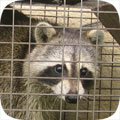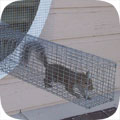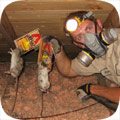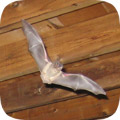- lewisburg@wildlifeanimalcontrol.com
Call 24/7 for a free quote:
304-306-7050
Lewisburg Wildlife Animal Control
Professional Wildlife Removal Company Servicing Lewisburg, WV
If you have a problem with wildlife in your Lewisburg home, your best option is to hire a company that specializes in West Virginia wildlife removal only. This is a specialty business, and regular pest control companies do not use the proper techniques to solve animal problems. I have spent many years reviewing West Virginia and Lewisburg, and I recommend the following:
Xceptional Wildlife Removal
Cell Phone: 304-306-7050
NOTE: If you have a dog or cat problem, call Greenbrier County Animal Services: (304) 645-4775

Xceptional Wildlife Removal specializes primarily in removing animals from attics of homes and buildings - this includes squirrels in attics, raccoons, and rats or mice in homes. West Virginia also has a documented problem with
bats in buildings, and Xceptional Wildlife Removal is specially trained in bat removal. They also perform general wildlife trapping services, such as the capture and removal of skunks or opossums on the
property. Call 304-306-7050 to discuss your critter problem and schedule a same-day or next-day appointment. Click here to learn more about
what prices we charge in 2024.
When hiring a company to solve your wild animal problem, you want these features:
- Specializes in wildlife removal, not pest control
- Fully West Virginia and Greenbrier County licensed and insured
- Works 7 days per week (critters don't take weekends off)
- Performs full building inspections: enters and inspects attic
- Performs exclusion repairs, with guarantee against animal re-entry
- Offers cleanup of biohazardous wildlife waste
Xceptional Wildlife Removal is a full-service Lewisburg wildlife removal company. This is very different from a regular Lewisburg pest control company. The pest control companies spray poison to kill insects. This is not at all
similar to wildlife removal. Xceptional Wildlife Removal performs a full inspection of the home or property, and determines why the animal(s) are there, and if inside a building, how the animals got inside. All
animals (including rodents) are trapped and removed, or if possible, removed from the building using special exclusion devices. Once the animals are gone, preventative repairs are essential, and
cleanup is sometimes recommended.
 Lewisburg wildlife trapping - it's not as simple as it may seem. It's illegal in West Virginia to trap without a license. Trap type is very important and there are many different types, bait is somewhat relevant, trap placement
is vital, and there are dozens of small things that are very important to know.
Safety is a concern. Then once the animal is trapped, it must be removed and dealt with in the proper manner according to West Virginia law. We offer Lewisburg raccoon removal. Read more about how to get rid of raccoons.
Lewisburg wildlife trapping - it's not as simple as it may seem. It's illegal in West Virginia to trap without a license. Trap type is very important and there are many different types, bait is somewhat relevant, trap placement
is vital, and there are dozens of small things that are very important to know.
Safety is a concern. Then once the animal is trapped, it must be removed and dealt with in the proper manner according to West Virginia law. We offer Lewisburg raccoon removal. Read more about how to get rid of raccoons.
 Animals in attics - this is our specialty at Xceptional Wildlife Removal. Many types of animals like to live in attics. This includes squirrels, raccoons, rats, mice, bats, birds, and even possums. Critters like to go into attics for a safe place to live
and raise their young. Removing animals from attics is very complex work, partly because of the presence of baby animals. If you need Lewisburg squirrel removal, we can remove all the squirrels from your attic, and seal out any future ones. Read more about how to get rid of squirrels.
Animals in attics - this is our specialty at Xceptional Wildlife Removal. Many types of animals like to live in attics. This includes squirrels, raccoons, rats, mice, bats, birds, and even possums. Critters like to go into attics for a safe place to live
and raise their young. Removing animals from attics is very complex work, partly because of the presence of baby animals. If you need Lewisburg squirrel removal, we can remove all the squirrels from your attic, and seal out any future ones. Read more about how to get rid of squirrels.
 Rodent control must be done in a very specific way. First off, the most important thing is that all the openings that rats and mice can use to enter a house be sealed. Then all the rodents must be physically trapped and removed.
Never, ever use poison! Most Lewisburg exterminators will just use this lazy poison technique to kill rodents, and it causes more harm than good - dead stinky rats, and it doesn't solve the problem. Call us for correct Lewisburg rat removal. Read more about how to get rid of rats.
Rodent control must be done in a very specific way. First off, the most important thing is that all the openings that rats and mice can use to enter a house be sealed. Then all the rodents must be physically trapped and removed.
Never, ever use poison! Most Lewisburg exterminators will just use this lazy poison technique to kill rodents, and it causes more harm than good - dead stinky rats, and it doesn't solve the problem. Call us for correct Lewisburg rat removal. Read more about how to get rid of rats.
 Bat removal is a highly specialized task. West Virginia is known to have colonizing bats who often live in buildings. Bats love attics. If not removed, the colony can grow to a very large size over the years. The bat droppings are often corrosive and
cause health risks. The same goes for bird droppings on or in buildings. We perform Lewisburg pigeon removal and bird control. But our specialty is Lewisburg bat removal. We remove 100% of the bat colony and seal the building so that it's totally bat-proof. Read more about how to get rid of bats.
Bat removal is a highly specialized task. West Virginia is known to have colonizing bats who often live in buildings. Bats love attics. If not removed, the colony can grow to a very large size over the years. The bat droppings are often corrosive and
cause health risks. The same goes for bird droppings on or in buildings. We perform Lewisburg pigeon removal and bird control. But our specialty is Lewisburg bat removal. We remove 100% of the bat colony and seal the building so that it's totally bat-proof. Read more about how to get rid of bats.
 If you have animals inside a house, no job is complete without proper exclusion repairs. If you simply hire a Lewisburg trapper who only removes the critters, then the problem will return. You need to hire a Lewisburg wildlife control company that identifies 100% of the animal entry points
into your building, and seals them shut with professional repairs. In addition, in many cases animals have left waste or contamination behind, and you'll want a company that can provide professional cleaning services. Xceptional Wildlife Removal does both.
If you have animals inside a house, no job is complete without proper exclusion repairs. If you simply hire a Lewisburg trapper who only removes the critters, then the problem will return. You need to hire a Lewisburg wildlife control company that identifies 100% of the animal entry points
into your building, and seals them shut with professional repairs. In addition, in many cases animals have left waste or contamination behind, and you'll want a company that can provide professional cleaning services. Xceptional Wildlife Removal does both.
The above are just some of the services offered by Xceptional Wildlife Removal. We also trap and remove animals that destroy lawns, such as moles, or digging animals. Sometimes animals like opossums will live under buildings, steal pet food, raid garbage cans, etc.
Read about how to get rid of opossums. Skunks commonly live under sheds or decks, and set up a den. We can trap and remove them without them spraying. Read about how to get rid of skunks. Xceptional Wildlife Removal
also provides dead animal removal in Lewisburg. If you need help with any other wildlife conflict, from a fox, beaver, groundhog, or any other critter, we can solve it. We also do Lewisburg snake removal - most of the snakes in West Virginia are not venomous, but
call us if you want safe removal, or read about how to get rid of snakes in Lewisburg. And remember, we are a private business, not Greenbrier County Animal Control Services, so if you have a dog or cat problem, call the County at (304) 645-4775.
Greenbrier County animal services does not handle any wildlife issues.
Xceptional Wildlife Removal
Cell Phone: 304-306-7050
Lewisburg Pricing Info
Every wildlife removal situation is different, from the species of animals involved, the location of the animal inside a house or outside, the extent of repairs or cleanup, etc. It's impossible to give one-size-fits-all prices. Examples MIGHT include:Small Job: For example, a one-stop job to remove an animal in the yard: $100 on up
Medium Job: For example, getting critters out of your house with minor repairs: $300 on up
Large Job: For example, a project involving many service trips and complex work: $500 on up
Give us a phone call now and tell us about your wildlife issue and we will be able to give you a price estimate over the phone. If you're cool with it, we can schedule a same-day or next-day appointment if you like. Our prices are fair, and a good value because we do the job right, the first time.
Lewisburg Wildlife Tip #1:
What happens to the groundhog after removal? - Do you love animals? If you do then you might want to know what happens to that wild groundhog that unfortunately caused quite a stir in your garden or yard. Most people probably wouldn't care what happens to the creature as long as it was no longer a problem in their lives, but in reality, it is always nice to know for your own peace of mind at least, that the animal has gone somewhere where it could live a long and prosperous life, as long as it wasn't giving you any more grief! The thing about releasing groundhogs it that it needs to be done so with caution. Place the animal too far away from where it was found and it could run into problems, such as becoming prey to undue predators, not being able to find food, not being able to find a place to call its home, and even becoming victim to accidents with cars. These are all things that a fully qualified wildlife control expert will try to avoid as best as possible. It will relocate the animal in a place that is not too far from where it was originally found, and although you may believe that this will enable the creature to come back, the expert should potentially be groundhog-proofing your home at the same time, or at least educating you so that this wild animal, as well as many others like it, can no longer be a problem.
Lewisburg Wildlife Tip #2:
Skunk house damage - Skunks don't do a lot of damage to a home or a building they live under. Yes, they will often dig their own dens, and sometimes these dens can cause structural damage to a foundation or a porch. Beyond that, skunks aren't constant chewers like rats or mice, so you don't have to worry about the critter chewing up the interior of your home. In fact, it's rare for a skunk to progress into the upper aspects of a home; when they invade your space, it's often in a basement or a crawlspace. The damage people frequently have to deal with is generally to the property itself. Skunks eat a lot of insects. They spend their time at night outside digging up the yard and any gardens that might be in the yard. When you wake up in the morning, your yard will be pock marked with little brown piles of soil. While the lawn damage is easily remedied, the smell of having a skunk around the property is enough to wish the animal was gone. If you're having issues, call a wildlife removal company to assist you.
West Virginia Wildlife Information:
West Virginia State bird: Northern cardinal
State mammal: Black bear
State reptile: Timber rattlesnake
State fish: Brook trout
State insect: European honey bee
West Virginia is almost entirely mountainous and is referred to as "the mountain state". It lies in the Appalachian region, which is the reason for all the changes in elevation. The lack of flat land has made this state less populous that it might otherwise be. The region has large lakes and beautiful hardwood forests comprise of oaks, maples, American sycamore, and chestnut. The climate is predominately warm and humid. The winters are short but can be wet, and the higher elevations see a significant amount of snowfall. Animals in the state are often encountered because of how close people live with nature among the hills.
There are numerous small animals, and with most homes nestled in the woods, pest issues are very common. People in West Virginia have issues with rats, mice, raccoons, skunks, opossums, porcupines, woodchucks, squirrels, wild boars, and foxes. The wild boars, while nuisances, were deliberately brought into the state and have since developed breeding populations. The boars have begun to migrate north, becoming unwelcomed visitor as far up as New York State.
While the boars were brought in to the state, heavy hunting and deforestation have eliminated many different native animals. West Virginia no longer has populations of elk, gray wolves, or bison. At one point in time, beavers, river otter and fishers were also eliminated, but these species have since been reintroduced. It has taken many decades, but there are substantial populations now in the wild. The largest predator in the state is the black bear. While these animals could easily take down a deer if they were so inclined to catch one, they prefer to go after less active prey-like berries and insects. Black bears can be particularly problematic for homeowners looking to have birdfeeders in their yards.
While most states have some stray cats and dogs, West Virginia has feral populations in the wild, which is uncommon for once-domesticated creatures. The long, warm summers and ample forests allow these animals to continue to thrive and breed away from humans. In addition to the wild cats and dogs, there is a breeding population of feral goats. The goats and the wild boars are good food for middle-level predators like coyotes. Bobcats will rarely take on an adult boar, but the cats are easily able to pick up a baby and carry it into a tree where the mother cannot retrieve it.
You can always call Xceptional Wildlife Removal, any time of day, at 304-306-7050, for a price quote for Lewisburg wildlife control services. I am confident that this is the best choice amongst wildlife removal companies in Lewisburg, WV.







































